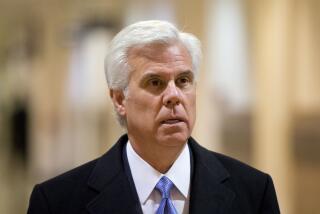Ex-Banker Indicted in Whitewater Probe : Investigation: Former head of Arkansas financial institution is charged with irregularities in Clinton’s 1990 race for governor.
- Share via
WASHINGTON — The former president of a tiny Arkansas bank was indicted Tuesday by a Whitewater grand jury for alleged irregularities in the financing of President Clinton’s 1990 campaign for governor of Arkansas.
The indictment of Neal T. Ainley, once president of the Bank of Perry County, was obtained from a grand jury in Little Rock, Ark., by independent counsel Kenneth W. Starr as part of his sweeping investigation of Clinton’s personal investments and campaign financing before he became President.
By naming Ainley, according to sources close to the case, Starr is seeking to persuade the former bank official to supply information implicating one of the President’s closest friends and advisers, Bruce Lindsey, who served as treasurer of Clinton’s 1990 gubernatorial campaign and now is deputy White House counsel.
Lindsey could not be reached for comment, but one of his lawyers, Bill Nussbaum, insisted that Ainley knows of no illegal act by Lindsey. “Mr. Ainley could not say anything that would implicate my client in wrongdoing because Mr. Lindsey has done nothing wrong,” Nussbaum told The Times.
Starr’s Whitewater investigation has led to the indictment of another of the President’s closest friends, Webster Hubbell, as well as the resignation of several top Clinton advisers.
Ainley is charged with five felony counts--among them conspiring with other unnamed persons to conceal last-minute withdrawals by the Clinton campaign from the Bank of Perry County. The money obtained in the withdrawals was used to help get out the black vote, which helped Clinton win the gubernatorial election.
According to the indictment, Ainley acted to conceal the withdrawals by failing to notify the Internal Revenue Service. Under law, the IRS must be notified of all transactions exceeding $10,000.
The indictment offered no reason for Ainley to conceal the withdrawals from the bank, which had loaned $180,000 to the Clinton campaign during 1990. The transactions in question were listed as a $30,000 withdrawal on May 25, before the primary election, and a $22,500 withdrawal on Nov. 2, prior to the general election.
Among other things, Ainley is also charged with delivering checks to a representative of the Clinton campaign and with intercepting outgoing mail from the Perry County bank for the purpose of altering the bank’s report of the transactions to the IRS.
One White House source said that Ainley’s alleged acts of concealment “make no sense,” since the Clinton campaign itself publicly disclosed the expenditures at the time on periodic reports filed with the state.
“The campaign made all the filings it was required to make and, in fact, publicly reported the get-out-the-vote expenditures stemming from the Perry County bank withdrawals in today’s indictment,” said Donald Kendall, the President’s private lawyer. “The campaign did not have any involvement whatsoever in the alleged wrongful conduct and would have had absolutely no reason to be involved.”
At the time of the 1990 election, the Bank of Perry County was run by longtime Clinton supporter Herbert Branscum, who was appointed state highway commissioner after Clinton’s reelection in 1990. Another bank official, Robert Hill, was later appointed by Clinton to the state banking board.
Clinton spent $2.8 million on his reelection in 1990 and carried a debt of more than $100,000 until shortly before he was elected President in 1992. While still in debt, the campaign shifted $35,000 of its borrowed money into a special account that Clinton continues to use for political activities in Arkansas. His critics claim that the fund was created illegally since he had not paid off his debts.
These activities appear to be unrelated to allegations that Clinton’s 1984 gubernatorial campaign failed to disclose about $35,000 it received from a fund-raising event hosted by James B. McDougal, who was a partner with the Clintons in the Whitewater real estate development. Some of those donations are alleged to have been withdrawn illegally from McDougal’s now-defunct Madison Guaranty Savings & Loan.
Times staff writer Ronald J. Ostrow contributed to this story.
More to Read
Sign up for Essential California
The most important California stories and recommendations in your inbox every morning.
You may occasionally receive promotional content from the Los Angeles Times.










